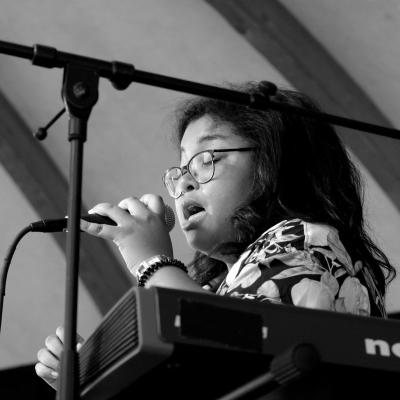Program
Develop your voice, your ear, control your breath, improve your posture and gain self-confidence: singing is certainly one of the most complete musical fields. By singing, the artist opens himself completely, he strips himself of all artifice and shares with his audience an intimate moment, in the greatest honesty.
Objectives and skills
Singing lessons allow the development of the voice posture, the development of the artistic personality, the vocal technique and the development of the voice through various styles. Learn to master the head, chest and mixed voice as well as the various types of vocality: belting, saturated voice, falsetto,... in order to be comfortable in the different styles.
The body plays a central role in singing technique. Thus, body and sensory work in the space and, for some, the development of body presence on stage, are themes addressed during the classes. Ear training, accuracy and improvement of rhythm, as well as improvisation and song creation for advanced students who wish to do so, will also be taught.
At Apolline's, music theory is integrated into the instrument class, sparingly and coherently with the subject studied by the child. In this way, theory sticks to practice and becomes digestible and interesting. To learn more about this subject, see our article on music theory lessons.
Learning music with Apolline
How do you get out of the usually rigid framework of the early years of musical learning found in most schools in Switzerland?
Based in Lausanne, Apolline has a different philosophy. Rather than offering children and teenagers the opportunity to learn in individual lessons, the emphasis is on small group lessons - of 2 or even 3 students, depending on the instrument. This group work will encourage listening, playing with others, improvisation, as well as a sense of musical sharing. The students will progress technically, while having the pleasure of playing music. The extra motivation generated by learning and progressing together is an important driving force.
The groups are always formed according to the age and level of competence of the students, in order to allow a coherent exchange and dynamic progression. For more information, see our article on private VS semi-private music lessons.
Apolline offers its students the possibility of integrating a music band workshop, in addition to the basic instrument course, to allow them to play with other musicians of their own age. Accompanied by a teacher, they will learn to play in a group, through covers or their own compositions.
Teachers
Prices
| Cours | Duration | Monthly Price* | One price** |
|---|---|---|---|
| Children and teenagers (under 18 years old) : | |||
| Semi-Private - 2 students | 40 minutes | 111.00 CHF | 1'250.00 CHF |
| Children and adolescents (under 18): | |||
| Privé | 30 minutes | 149.00 CHF | 1'690.00 CHF |
| Privé | 40 minutes | 166.00 CHF | 1'890.00 CHF |
| Privé | 50 minutes | 179.00 CHF | 2'090.00 CHF |
| Adults (from 18 years old): | |||
| Privé | 30 minutes | 166.00 CHF | 1'890.00 CHF |
| Privé | 40 minutes | 175.00 CHF | 1'990.00 CHF |
| Privé | 50 minutes | 189.00 CHF | 2'190.00 CHF |
* 12 monthly payments from September to August (voir notre règlement).
** Price for the payment of the whole year's courses in one payment.
Prices are valid for annual registration (courses from September to June). All fees are included in the prices listed. Registration during the year is possible (prorated according to the number of remaining courses)

